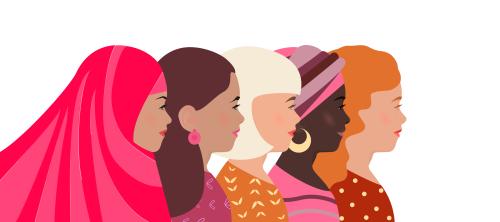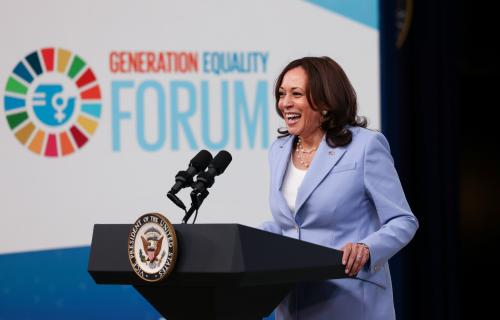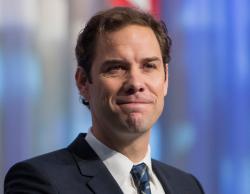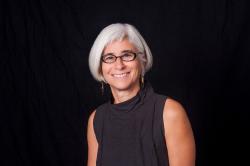In this blog, John W. McArthur, director of the Center for Sustainable Development at Brookings, interviews incoming Senior Fellow Caren Grown.
I am thrilled to announce that Caren Grown will join the Center for Sustainable Development (CSD) and the Global Economy and Development program at Brookings as a full-time senior fellow, starting this September. Caren brings a distinguished track record of leadership and service to Brookings, building on a career spanning policy, academia, civil society, and philanthropy. Most recently, Caren spent seven years, from 2014 to 2021, as global director for gender at the World Bank, where she currently is a senior technical adviser. She also previously served as senior gender advisor at the U.S. Agency for International Development (USAID), where she led the development and implementation of a new gender policy for the agency. Prior to that, Caren held academic appointments at American University and Bard College, directed the poverty reduction and governance team at the International Center for Research on Women, and spent nearly a decade in a variety of global program roles at the MacArthur Foundation.
At CSD, Caren will be launching a major new workstream focused on the economics of tackling gender gaps at the core of sustainable and inclusive development. This is likely to include emphasis on issues like financing investments for care, women’s economic empowerment, and filling gender data gaps. As with other CSD scholars, she will focus on a mix of her own independent research and collaborations with colleagues around the world, while helping to inform the ongoing evolution of CSD’s own strategic thinking.
This week I had the opportunity to interview Caren regarding her unique perspective on the global challenges of advancing gender equality. I hope readers enjoy learning more about the depth and breadth of insights she will bring to the Brookings community.
John McArthur (JM): Right now, many people are focused on issues of conflict and climate change. How does your work fit into this?
Caren Grown (CG): This current context—April 2022—is still reeling from the impacts of the COVID-19 pandemic and related economic upheavals. Research at the World Bank reveals the gender impacts of the pandemic. Not only have women in many countries been hit harder than men by job loss and disruptions in education and key services that increased their caregiving responsibilities, but in the Global South especially, women’s care work has been further compounded by climate-related changes—from increased disease burdens to loss of safe drinking water to crop failures that jeopardize food security and livelihoods. I have teamed up with Ito Peng from the University of Toronto to explore the intersections between the care and climate crises as they manifest at the local level. We are interested in public and private financing modalities, regulatory frameworks and mechanisms, governance implications, and new urban planning approaches. I also plan to write a book with my former colleague from American University, Maria Floro, revisiting gender and development in the context of climate change.
Unfortunately, the world has witnessed several conflicts in the past few years, from Myanmar to Tigray to Afghanistan to Ukraine, that have further exacerbated women’s and girls’ risks of gender-based violence, forced displacement, and increased poverty relative to men. My colleagues at the World Bank have produced some great papers on the gender dimensions of forced displacement with new empirical evidence. Geeta Rao Gupta and I have recently written a paper that explores how the humanitarian community can do better at addressing the risks and impacts of conflict and violence and adopt a new approach to be more effective at addressing key gender inequalities in very fragile contexts.
JM: Within the domains you know best, are there any big opportunities for advancing gender equality over the coming decade?
CG: While the current context may seem bleak, there are opportunities for advancing gender equality and women’s rights and empowerment in the coming decade. As I said before, the first opportunity is to accelerate progress on accessible and sustainable child and elder care. There are efforts around the world to put in place infrastructure and services for care of children and the elderly and many exciting initiatives at both national and local levels. For instance, Jordan and Iraq made commitments to increasing women’s labor force participation by 5 percent, which involves investments in care services. In Latin America, Colombia and Uruguay have had success in creating an infrastructure of formal and informal services, and Chile is following suit. At a more local level, the province of British Columbia in Canada and the city of Portland, Oregon, seek to create thousands of quality, affordable child care spaces, build climate-resistant facilities, and train more people to become early childhood educators.
A second opportunity is to accelerate digitalization and importantly, digital financial services, for women entrepreneurs, self-employed workers, and recipients of government services such as social protection and cash transfers. Closing the gender digital divide in mobile phone and internet access is a basic first step but is not enough. During the COVID-19 pandemic, countries like India and Togo began digitizing and expanding government services. For instance, in April 2020, Togo launched the Novissi program, which draws on machine learning techniques to deliver contactless, emergency cash transfers to the poorest households. The highest payouts were reserved for women given their caregiving responsibilities, and women comprised nearly two-thirds of the 572,852 beneficiaries during the first six months of the program.
A third opportunity is the momentum around gender data collection, curation, and use. High quality gender data is still lacking in too many countries. I have been involved in research, experimentation, and advocacy for more gender data since 2012 when we launched Data2X, housed at the United Nations Foundation. Over the last decade, the agenda has gained traction. Gender data is being increasingly recognized as fundamental to achieving gender equality and the Sustainable Development Goals (SDGs), and it is essential for good policy and program design. I am thrilled that the U.N. has produced guidelines for collecting individual-level, within-household asset information—on ownership, control, valuation, and use. The World Bank is now working with 12 national statistical offices to improve the scope and quality of their gender data, especially in the economic realm where the gaps are greatest. And the International Labor Organization (ILO), the World Bank, and Data2X recently completed the Women’s Work and Employment Program to better measure and operationalize the 2019 ILO definitions of work with new survey instruments, sampling techniques, and a more harmonized approach to data collection. The Commission on the Status of Women set out some ambitious but concrete recommendations for closing gender data gaps. I am hopeful that these initiatives will become part of the DNA of global and national statistical architectures.
JM: You are a long-standing leader at the interface of feminist economics and orthodox economics. How much have the two schools of thought merged in recent years, and what key differences still remain?
CG: It is very interesting to see how these two fields both converge and diverge. Mainstream microeconomics—along with the fields of labor and development economics—has begun to focus on issues long the domain of feminist economists. This includes such topics as what constitutes economic activity, unpaid work and the provision of care, gender power differentials, discrimination in labor markets, measurement of women’s work, agency and poverty, and gender-based violence. Both mainstream and feminist economists recognize that households are sites of cooperation and conflict and that household members bargain and negotiate over resource allocation and use, although there are different emphases on the type of bargaining model used in analysis.
On the other hand, mainstream macroeconomics still diverges from feminist macroeconomics. When Nilufer Cagatay, Diane Elson, and I founded the International Working Group on Gender and Macroeconomics in the 1990s, gender was strikingly absent from macroeconomics. Now there is a burgeoning literature in both the neoclassical and post-Keynesian traditions. Mainstream macroeconomics tends to focus on supply-side issues, emphasizing how gender differences in education, fertility decisions, or labor force participation influence economic growth. Stephan Klassen, for instance, has a landmark 1999 paper that describes the pathways and empirically estimates the effect of gender inequality on growth. Mainstream macro modelers follow in the Solow growth modeling tradition or more recently pursue an overlapping generations approach, which can capture the effect of intra-household bargaining. However, feminist economists are uncomfortable with the assumptions in these models of labor market flexibility and full employment.
Feminist macroeconomists—who also focus on economic growth, but growth as an input into capabilities and well-being and not as an end in itself—bring in demand-side issues, as well as care as an economic activity. They have different starting points than the mainstream: Labor is not exogenous but is a produced factor of production, demand is constrained since savings are independent of investment, and the distribution of income between capital and workers affects aggregate demand. Further, feminist economists note that gender job segregation—for instance the division of labor between paid and unpaid labor and segregation in occupations and industries—are structural features of every economy.
JM: What are your own top research priorities for the next few years?
CG: I look forward to delving deeper into the intersection of climate change, gender, and development. I also intend to continue my focus on gender and fiscal policy, especially as countries recover from myriad crises. I am working on gender and taxation, extending research I carried out in 2007-2010, and collaborating with colleagues at the World Bank and CEQ Institute to understand how women and men experience the different burdens from taxation and the benefits created by public budgets through a new fiscal incidence methodology. I hope to stay engaged with my colleagues at the World Bank to pilot this methodology in different countries. And of course, gender data remains close to my heart. I look forward to continuing my partnership with Data2X and others to fill gender data gaps. Finally, developing alternative approaches to gender mainstreaming in both the development and humanitarian fields, reflecting on my experience at USAID and the World Bank, is a legacy I want to leave for the next generation. There is so much to learn from behavioral science-based policy approaches that we can bring into fiscal and other policy reforms and institutional strategies to advance gender equality. I’m eager to bring this work into processes to accelerate progress toward the SDGs, such as the 17 Rooms initiative and other Brookings efforts.
JM: We’ve previously talked about networked approaches to global challenges. How do you see this fitting in with your new role?
CG: Networks can be powerful incubators of paradigm and policy change, and they have been a hallmark of my own professional trajectory. As a senior program officer at the MacArthur Foundation in the 1990s, I coordinated a five-year economics initiative consisting of interdisciplinary research networks that addressed policy issues less emphasized by the profession at that time—globalization, inequality, and the economics of families. The research produced by scholars in those networks has influenced the field of economics. As I mentioned, I also co-founded the International Working Group on Gender and Macroeconomics that brought together economists with diverse views and produced two special issues of the journal World Development in 1995 and 2000. Today, even the IMF has a research program on gender and macroeconomics! Stimulating new networks—with out-of-the-box thinkers and actors—will be a core part of my activities at Brookings. I strongly believe there is much to be gained by bringing together open-minded scholars from various disciplines in active dialog and collaboration to better inform policy discourse on how to improve outcomes for both men and women.
The Brookings Institution is committed to quality, independence, and impact.
We are supported by a diverse array of funders. In line with our values and policies, each Brookings publication represents the sole views of its author(s).








Commentary
The global challenge of gender equality: Welcoming Caren Grown to Brookings
April 11, 2022